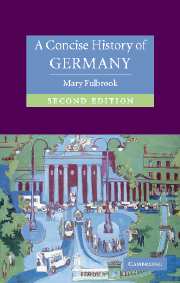Book contents
- Frontmatter
- Contents
- List of illustrations
- Preface
- 1 INTRODUCTION : THE GERMAN LANDS AND PEOPLE
- 2 MEDIAEVAL GERMANY
- 3 THE AGE OF CONFESSIONALISM, 1500–1648
- 4 THE AGE OF ABSOLUTISM, 1648–1815
- 5 THE AGE OF INDUSTRIALISATION, 1815–1918
- 6 DEMOCRACY AND DICTATORSHIP, 1918–45
- 7 THE TWO GERMANIES, 1945–90
- 8 THE FEDERAL REPUBLIC OF GERMANY SINCE 1990
- 9 PATTERNS AND PROBLEMS OF GERMAN HISTORY
- Suggestions for further reading
- Index
3 - THE AGE OF CONFESSIONALISM, 1500–1648
- Frontmatter
- Contents
- List of illustrations
- Preface
- 1 INTRODUCTION : THE GERMAN LANDS AND PEOPLE
- 2 MEDIAEVAL GERMANY
- 3 THE AGE OF CONFESSIONALISM, 1500–1648
- 4 THE AGE OF ABSOLUTISM, 1648–1815
- 5 THE AGE OF INDUSTRIALISATION, 1815–1918
- 6 DEMOCRACY AND DICTATORSHIP, 1918–45
- 7 THE TWO GERMANIES, 1945–90
- 8 THE FEDERAL REPUBLIC OF GERMANY SINCE 1990
- 9 PATTERNS AND PROBLEMS OF GERMAN HISTORY
- Suggestions for further reading
- Index
Summary
A cluster of changes occurring in the late fifteenth and early sixteenth centuries appear to render this period an important turning point in European history. The (re)discovery of America in 1492 opened up a new world, with significant effects on the economies and politics of the old world; the ‘late mediaeval crisis of feudalism’ initiated the formation of a propertyless wage-labouring class, the harbinger of developing capitalism; the emergence of an interacting system of increasingly centralised European states began to displace the dispersed sovereignty and more localised politics of feudalism; the invention of a technique of printing with movable type by Gutenberg radically altered the character of intellectual life; and the Reformation initiated by Martin Luther shattered the religious and cultural unity of mediaeval Christendom, with a process of territorial confessionalisation both sustained by and sustaining the concomitant processes of territorial state-building.
These major changes in European history should not blind us to certain continuities, particularly in relation to Germany. The period from the mid-fourteenth century to the mid-seventeenth century was characterised by a continued – and developing – territorial particularism within a relatively weak wider Imperial framework. German society continued to be largely based on feudal agrarian relations. While the economy of England expanded, that of Germany grew less rapidly, or stagnated. And for all the elements of ‘modernity’ that historians have sought in the Reformation, there was much that was essentially ‘mediaeval’ in sixteenth-century thought and beliefs.
- Type
- Chapter
- Information
- A Concise History of Germany , pp. 33 - 68Publisher: Cambridge University PressPrint publication year: 2004



